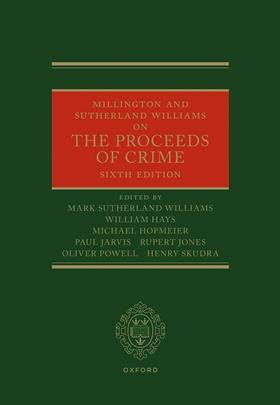Seizing 'evil-gotten gains'
Millington and Sutherland Williams on the Proceeds of Crime (sixth edition)
Edited by Mark Sutherland Williams, William Hays, Michael Hopmeier, Paul Jarvis, Rupert Jones, Oliver Powell, and Henry Skudra
£240, Oxford University Press
★★★★✩
In 1547, Thomas Michell murdered Eleanor and John Sydnam and then killed himself. The local Under Sheriff, Nicholas Sarger, went to Michell’s home to seize his goods, as he knew him to be a ‘man of great possessions’, rumoured to be more than a thousand pounds. When he arrived, he found the neighbours taking everything they could carry. The King’s Almoner, Nicholas Heath, then started legal proceedings to claim all Michell’s goods for himself on the basis that, as well as being a murderer, Michell’s death was suicide. (Suicide was also a crime.)
From the medieval period, anyone who had committed a serious crime (a felony) forfeited all their possessions to the Crown. This continued until the Forfeiture Act 1870 abolished the automatic forfeiture of goods and land as a punishment for treason and felony. Today, once again, the state seeks to prevent serious criminals keeping their ‘ill-gotten gains’ to enjoy on their release. The complete phrase, ‘evil-gotten gains never prosper’, is fitting for this topic.

The Proceeds from Crime Act 1971 was designed to prevent criminals profiting from their crimes but it had limitations and was amended in the 1980s and 1990s. Recent legislation also includes the Drug Trafficking Offences Act 1986. This first attempt to tackle laundering the proceeds of drug trafficking was prompted by courts’ difficulties in confiscating some £750,000 of drug trafficking proceeds connected with Operation Julie, a police investigation into LSD. The drugs concerned are thought to have had a street value of £100m, equivalent to £661m today.
In 2002, parliament passed the Proceeds of Crime Act, which is still the main legislation in this area. As well as consolidating much of the law, this act set up the Assets Recovery Agency, which was eventually abolished and its powers transferred to the Serious Organised Crime Agency, now the National Crime Agency. Further changes came with the advent of the Serious Crime Act 2015 and Criminal Finances Act 2017.
This authoritative book on the law relating to recovering proceeds is now in its sixth edition. It covers topics such as restraint orders and confiscation hearings, civil recovery and appeals. There is also a chapter on sanctions, as well as the impact of crypto currencies, and a new chapter focusing on part six of POCA which relates to the National Crime Agency’s general revenue functions. There is also a set of appendices, including sections from legislation and precedents for various orders.
The volume is a considerable work of scholarship and is relevant to all criminal lawyers.
David Pickup is a partner at Pickup & Scott Solicitors, Aylesbury































No comments yet